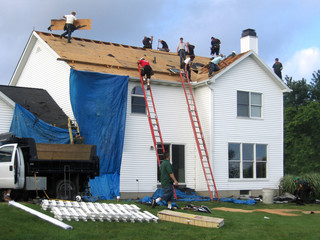A professional roofer can help homeowners avoid costly repairs or even structural damage. Roof repair can often start repairs quickly once the contract is signed.

Roofers work in teams, so it’s a good idea to ask for references from friends, family, and neighbors before hiring one. Homeowners associations may also have preferred roofing contractors they’ve used.
Roofers are responsible for repairing, maintaining, and installing roofs on homes or commercial buildings. Their duties include inspecting roofs to determine the best course of action, laying down new roofing materials and cement, cleaning up work areas, providing clients with estimates on labor costs and materials, and ensuring that safety standards are always adhered to. They may also be responsible for removing old shingles, waterproofing existing roofs, or installing vapor barriers and insulation to improve the structure’s energy efficiency.
This is a physically demanding job that involves a lot of standing, climbing, walking, and carrying of materials. It is also often performed outdoors during inclement weather, which can lead to a variety of physical injuries. In order to become a Residential Roofer, applicants must complete four-year apprenticeship programs and pass rigorous on-the-job training and technical courses. Those who are successful in this career will be awarded a journeyperson certificate.
A Roofer can learn the trade through on-the-job training or by obtaining a formal education. Some states require Roofers to be licensed. This is a simple process and usually requires past experience, insurance and in some instances a bond.
An Associate degree in construction management is a good way to gain the education you need to be a successful Roofer. Many universities offer this type of degree, which typically takes two years to complete and offers classroom learning as well as hands-on training. An apprenticeship is also a great way to get the experience you need to become a Roofer. Many construction companies will work with programs that allow students to intern and help them learn the trade.
Getting certified as a Roofer will show potential employers and clients that you are serious about the job. This can be done through a variety of different organizations and often costs less than a college degree. Some states require Roofers to be licensed, which is a simple process and usually only requires previous experience, insurance and in some instances a contract bond.
The most common path to becoming a Roofer is working as an apprentice with a roofing construction company. These programs are offered in many places throughout the United States and can be found through vocational schools or community colleges. These programs will not only give you experience, but sometimes can also work as school credit or for paying internships.
Regardless of whether you have obtained your education or gained on the job training, it is recommended that you consider becoming certified as a Roofer through the National Roof Certification and Inspection Association. This can help show both customers and future construction managers that you are qualified to be doing work on their home’s roof.
Most states require Roofers to be licensed on the state level before they begin work. This usually requires that you pass an exam, provide insurance information and in some instances a bond. This is to ensure that you will follow all safety regulations when working so high above the ground. This can be a dangerous profession, so it is important to be properly trained and certified. Some states require only that a roofing construction company be certified, while others will license individual Roofers as well.
Residential roofers are the people you call when you have a problem with your home’s roof. They offer a wide range of services to help keep your house safe and dry.
They can also install other components on your roof, such as vents and ice melt systems. These upgrades can save you money on your energy bills and make your home look great all year round.
Roofing is a high-paced, physically demanding job that can be time-consuming to complete. That’s why it’s important to find a roofer who’s committed to saving you time and money by delivering excellent results in an efficient manner.
When it comes to pricing a roof, you want to be sure the contractor is considering all of the factors that will affect its cost. For example, if you have a sloped roof or a pitched valley, that should factor into the price.
Another thing to watch for is the amount of material a contractor orders on each job. Running out of materials during a day’s work will mean they need to stop and send a runner out for more shingles or nails, which can slow down their progress.
When a roof needs to be replaced, it can be a major expense. But, it doesn’t have to put you in debt.
One way to save money on a residential roof replacement is to choose energy-efficient materials. These are often more expensive upfront, but they can help reduce utility costs in the long run due to their better insulation properties.
Another way to save money is to work with a local contractor who knows your area and the issues it experiences regularly. This can help them purchase materials at a lower cost and avoid shipping fees.
It’s also smart to choose a roofer who will provide you with a detailed contract detailing the scope of the project. It should include details such as payment amounts, safety procedures and cleanup methods.
When you hire a residential roofer to repair or place your roof, you’re reducing the likelihood of damage to your home. Attempting to do roofing repairs or placing a roof yourself is a dangerous task that can cause injuries.
In addition, a residential roofing professional is familiar with local building codes which can save you time and money by ensuring that all work is done correctly.
They also know about your area’s weather conditions, which means they can recommend the best roofing materials for your climate.
Moreover, they are less likely to be predatory and may have references you can check out before accepting their bid. They are also more easily accessible if you need help after they’ve finished the job. This is a huge relief for homeowners who are dealing with storms or leaky roofs.
Roofing is a huge component of any home, and residential roofers understand how to make it work for you. From energy-efficient insulation and roof materials to ventilation in the attic, there are many ways that your roof can save you money on your utility bills.
You might be asking yourself why you should hire a professional roofer to place or repair your roof, and that’s a valid question. Attempting to place or replace your own roof can be risky and dangerous, so it’s best to leave this task to the pros. A good residential roofing company will be up to code and provide the best service possible, at a reasonable price. They will also be able to tell you which is the best roofing material for your home.
Residential Roofers can be great saviors when you need your roof fixed, whether it is an emergency or just a routine maintenance job. They can save you pain by catching problems before they become too serious, which may prevent the need for a full roof replacement. They can also help you determine the best roofing material for your home, like asphalt shingles or concrete tiles. They can also provide you with door-to-door bids, but watch out for predatory contractors who may charge you more than you should pay.
Finally, Residential Roofers can connect you with the roofing experts in your area that can do anything from shingle replacements to flashing and soffit work, fascia repairs, and gutter cleaning. They can even accept payment via credit card or e-check, making the process fast and secure for both parties involved.



